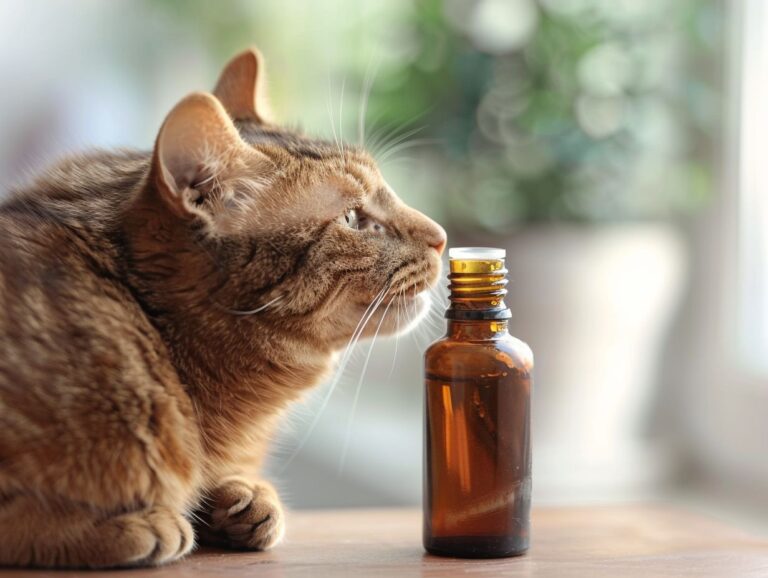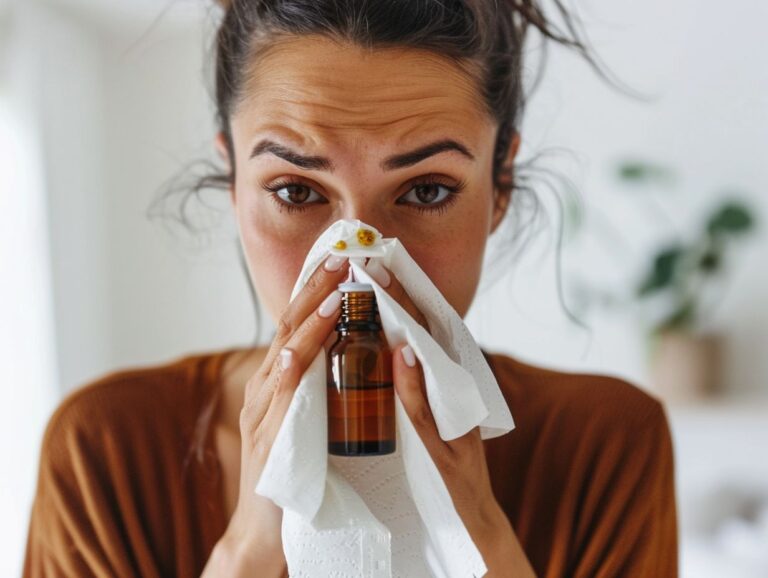Can Essential Oils Cause Headaches and Dizziness
Essential oils have gained popularity for their various health benefits and therapeutic properties.
Some individuals may experience headaches and dizziness when using essential oils.
We explore the possible causes of these symptoms, how to prevent them, and when to seek medical help.
We discuss alternative methods for aromatherapy and provide tips on safe usage of essential oils.
Learn more about essential oils and how to enjoy their benefits without the unpleasant headache from oils.
Key Takeaways:
What Are Essential Oils?
Essential oils are natural extracts obtained from various plants and have been used for centuries in traditional medicine and aromatherapy.
These potent oils are obtained through processes like distillation, expression, or solvent extraction, where the essence of the plant is carefully extracted to ensure its therapeutic properties are preserved. Dating back to ancient civilizations like Egypt, Greece, and China, essential oils have held significant cultural and medicinal value. The Egyptians used oils for religious ceremonies and mummification, while the Greeks integrated them into their holistic approach to healing. Today, essential oils are popular for their various benefits, including stress relief, skin care, and boosting overall well-being.
How Are Essential Oils Used?
Essential oils can be used in a variety of ways, including topical application on the skin, inhalation through diffusion, and even blending with carrier oils for massages.
When applying essential oils topically, it’s crucial to dilute them properly with a carrier oil to prevent any skin irritations. Common carrier oils like coconut, jojoba, or almond oil can help to spread the essential oil over a larger surface area and reduce sensitivity. For aromatherapy benefits, diffusing oils in a diffuser not only freshens the air but can also have a calming or invigorating effect, depending on the essential oil used. It’s recommended to start with a few drops and adjust according to the size of the room and personal preference.
Can Essential Oils Cause Headaches and Dizziness?
While essential oils are generally safe when used properly, they can cause adverse reactions like headaches, dizziness, and even toxicity in some cases.
Headaches and dizziness are common symptoms that may occur due to the potent nature of essential oils. Some individuals may also experience skin irritation, allergic reactions, or respiratory issues when exposed to certain oils.
Ingesting essential oils poses significant risks as they are highly concentrated substances that can lead to digestive upset, liver damage, or even poisoning. It is crucial to never consume essential oils internally without professional guidance.
To prevent adverse effects, always dilute essential oils properly before topical application and perform a patch test to check for allergic responses. Proper ventilation is essential during aromatherapy to minimize the risk of respiratory irritation.
What Are the Possible Causes of Headaches and Dizziness from Essential Oils?
The possible causes of headaches and dizziness from essential oils can vary, depending on factors such as the quality of the oils, specific components like peppermint oil, individual reactions, and the reputation of the manufacturing company.
In terms of quality control, using organic or pure essential oils that are free from additives and chemicals can significantly reduce the risk of adverse reactions. In the case of peppermint oil, its high concentration of menthol can be a trigger for sensitivities in some individuals, leading to symptoms like headaches and dizziness.
Individual reactions play a crucial role as well, as each person’s body chemistry is unique, making them more susceptible to certain oils. This emphasizes the importance of conducting patch tests before widespread use, especially for those with sensitive skin or existing allergies.
What Are the Symptoms of Headaches and Dizziness from Essential Oils?
Symptoms of headaches and dizziness from essential oils may include headache, dizziness, nausea, and in severe cases, poisoning or allergic reactions.
These symptoms often arise due to individual sensitivity to specific essential oil compounds, leading to a range of adverse reactions. Headaches can manifest as throbbing or sharp pain, often accompanied by sensitivity to light or sound, while dizziness may cause lightheadedness and imbalance. Nausea, another common symptom, can range from mild discomfort to severe stomach upset. In severe cases, such as poisoning or allergic reactions, symptoms may escalate rapidly, leading to respiratory distress, skin rashes, or even anaphylaxis, necessitating immediate medical intervention.
How Long Do the Symptoms Last?

The duration of symptoms from essential oil exposure can vary depending on factors such as the type of oil, concentration, individual tolerance, and the method of application.
For instance, some essential oils may cause immediate irritation or allergic reaction upon contact, leading to symptoms like redness, itching, or swelling. Conversely, others might have a delayed onset of effects, manifesting hours or even days after exposure. The concentration and potency of the oil play a crucial role in symptom persistence; highly concentrated oils may result in more severe and longer-lasting symptoms.
How to Prevent Headaches and Dizziness from Essential Oils?
Preventing headaches and dizziness from essential oils involves measures such as proper dilution, using lower concentrations, selecting milder oils like lavender or ginger, and avoiding direct inhalation from the nostrils.
To ensure a safe and enjoyable experience when using essential oils, it is crucial to follow some key preventive strategies. One of the most important tactics is dilution – always remember to dilute essential oils with a carrier oil before applying them to the skin. This helps reduce the risk of skin irritation or sensitization. When choosing essential oils, opt for gentle options such as chamomile or peppermint, which are less likely to cause adverse reactions. Consider alternative application methods like diffusing oils in the air instead of applying them directly to the skin.
Dilute Essential Oils Properly
One key preventive step is to ensure that essential oils are properly diluted before use, especially when dealing with high-concentration oils, by mixing them with carrier oils like almond or coconut oil.
Proper dilution plays a crucial role in reducing the risk of adverse reactions caused by using undiluted essential oils directly on the skin. The general rule of thumb is to dilute essential oils in a carrier oil at a ratio of 2-3% for adults, or even lower, depending on the individual’s sensitivity. Common carrier oils like jojoba, grapeseed, or olive oil are frequently used due to their neutral scent and skin-nourishing properties.
It’s essential to perform a patch test on a small area of skin before applying a newly diluted essential oil mixture to a larger area to ensure compatibility and prevent any allergic reactions. Always follow reputable guidelines on dilution ratios and safe practices to maximize the benefits of using essential oils while minimizing the potential risks.
Use High-Quality Essential Oils
Opting for high-quality essential oils from reputable brands can significantly decrease the likelihood of experiencing headaches or dizziness, as they ensure purity and proper formulations.
When selecting essential oils, it is crucial to consider the purity standards followed by the brand. Reputable companies often adhere to strict quality control measures, ensuring that their oils are free from contaminants or adulterants, which could trigger unwanted reactions.
Along with purity, the manufacturing practices also play a pivotal role in the quality of the oils. Trusted brands prioritize sustainable sourcing, ethical production methods, and transparent labeling, giving consumers peace of mind about the products they are using.
Avoid Using Essential Oils on Sensitive Areas
Sensitive skin areas like the face, neck, and mucous membranes should be avoided when applying essential oils to prevent potential irritation or adverse reactions.
These regions are particularly vulnerable to the concentrated nature of essential oils, which can lead to redness, itching, or even chemical burns if applied directly. Performing a patch test before widespread use is crucial for individuals with sensitive skin. This involves applying a small amount of diluted oil to a small area and monitoring any adverse reactions over 24 hours. Patch testing helps identify any potential allergies or sensitivities before full application, reducing the risk of skin irritation or inflammation.
Take Breaks from Using Essential Oils
Periodic breaks from the consistent use of essential oils can provide relief and reduce the risk of developing tolerance or sensitization, allowing the body to reset and respond more positively to subsequent therapy.
When we continuously use essential oils without giving our body time to rejuvenate, it may lead to diminished effects over time.
By incorporating therapeutic breaks into your routine, you give your body the chance to recalibrate and fully benefit from the healing properties of the oils.
This holistic approach not only enhances the efficacy of the oils but also promotes overall wellness by harmonizing mind, body, and spirit.
What Are the Alternatives to Essential Oils for Aromatherapy?

It’s essential to acknowledge that while some people find great relief in traditional essential oils, others may experience adverse effects due to their sensitivity. In these cases, exploring alternative oils with comparable therapeutic properties can be incredibly beneficial in maintaining a holistic approach to health and wellness.
Eucalyptus oil, for instance, is renowned for its soothing and invigorating effects, making it a fantastic substitute for those who may react negatively to more commonly used oils. Clove oil is another excellent option with its potent antimicrobial properties, while tea tree oil is well-known for its antibacterial and antifungal attributes.
Diffusers
Using diffusers can be an effective way to enjoy the benefits of aromatherapy without direct contact with essential oils, providing a gentle and continuous diffusion of scents in the surroundings.
Diffusers are versatile devices that come in various types, including ultrasonic, nebulizing, and heat-based models. Ultrasonic diffusers use water to disperse the essential oils, creating a fine mist that can humidify the air, while nebulizing diffusers break down the oils into tiny molecules for direct inhalation. Heat-based diffusers, on the other hand, rely on heat to release the aroma into the air.
By diffusing essential oils, these devices can help set a calming ambiance, relieve stress, promote better sleep, and even improve concentration. The process of inhalation therapy through diffusers allows for easy absorption of the oils into the bloodstream, providing rapid therapeutic effects.
Scented Candles
Scented candles offer a subtle and indirect method of introducing pleasant fragrances into an environment, creating a soothing ambiance for relaxation and therapeutic benefits.
Besides their calming effects, scented candles are widely used in enhancing mindfulness practices and creating a harmonious atmosphere in living spaces. Different scents such as lavender, sandalwood, and chamomile can evoke specific emotions and trigger memories, aiding in stress relief and mental well-being. The flickering flame and gentle scent of a candle can help in unwinding after a long day, promoting a sense of tranquility and balance. Scented candles come in a variety of container styles, sizes, and designs, making them a versatile and aesthetic addition to any room.
Room Sprays
Room sprays infused with calming scents like lavender or chamomile can be an effective way to freshen up spaces while promoting relaxation and stress relief through aromatherapeutic properties.
These room sprays offer a convenient and quick way to transform any room into a tranquil oasis. The gentle mist of lavender can evoke a sense of peace and help unwind after a long day, while chamomile provides a soothing effect, perfect for creating a bedtime ritual. With their natural fragrances, these sprays not only mask unpleasant odors but also uplift the mood and enhance overall well-being. Whether you’re working from home or seeking a moment of self-care, incorporating these floral scents into your daily routine can make a significant difference.
Natural Fragrances
Natural fragrances derived from botanical sources provide a wholesome alternative to essential oils, offering varied scents and therapeutic effects without the risk of sensitivities or adverse reactions.
These natural fragrances, often created through sustainable practices, harness the power of plants and flowers to evoke a range of pleasing scents that can uplift moods and enhance well-being. Organic botanical ingredients such as lavender, rose, and citrus not only smell delightful but also carry calming, energizing, or refreshing properties, catering to different preferences and needs. What makes these fragrances particularly appealing is their gentle nature, making them suitable for individuals with delicate skin or allergies.
When to Seek Medical Help for Headaches and Dizziness from Essential Oils?
In case of persistent or severe symptoms of headaches and dizziness from essential oils, seeking medical advice is crucial to determine appropriate treatment options and ensure the effectiveness of interventions.
Consulting medical professionals in such situations is paramount as they can provide specialized care tailored to the individual’s needs. Treating adverse reactions to essential oils requires expertise and specific knowledge in toxicology and dermatology. Established Poison Information Centers play a vital role in guiding both the public and healthcare providers on managing cases of poisoning or adverse effects. These centers offer valuable resources and up-to-date information on treatment protocols, aiding in prompt and effective intervention when dealing with toxic exposures.
Conclusion

These concentrated plant extracts are widely used in aromatherapy for their therapeutic potential, helping to alleviate stress, anxiety, and even promote better sleep. It’s essential to use them with caution and dilute properly, as some oils can be irritating to the skin or harmful if ingested.
In terms of lavender, its versatility shines through as it not only soothes inflammation but also aids in relaxation and mental clarity. The floral scent of lavender can help create a calming atmosphere, making it a favorite for unwinding after a long day. Can essential oils give you a headache or cause dizziness?
Frequently Asked Questions
Can essential oils cause headaches and dizziness?
Yes, some essential oils can cause headaches and dizziness in certain individuals. It all depends on the person’s sensitivity to the specific oil and how it is used.
Which essential oils are known to cause headaches and dizziness?
Some common essential oils that have been reported to cause headaches and dizziness include peppermint, eucalyptus, lavender, and citrus oils. However, it may vary from person to person.
How do essential oils cause headaches and dizziness?
Essential oils contain potent aromatic compounds that can stimulate the nervous system and trigger headaches and dizziness. They can also cause irritation to the respiratory system, leading to symptoms like dizziness and headaches.
Can using too much essential oils cause headaches and dizziness?
Yes, using too much essential oils can certainly cause headaches and dizziness. It is always important to follow proper dilution guidelines and use essential oils in moderation to avoid any adverse effects.
Can essential oils be used to treat headaches and dizziness?
While some essential oils may cause headaches and dizziness, others may actually be helpful in relieving these symptoms. Peppermint and lavender oils have been traditionally used for headaches, while ginger and rosemary oils may help with dizziness.
How can I use essential oils safely to avoid headaches and dizziness?
To use essential oils safely and avoid headaches and dizziness, make sure to properly dilute them with a carrier oil before applying them to the skin. It is also important to do a patch test first and to avoid using essential oils near the eyes or on broken skin. Consult with a certified aromatherapist for guidance on safe and proper usage.








4 Comments